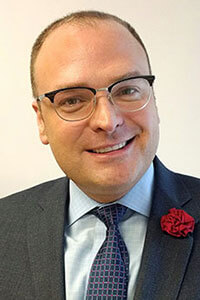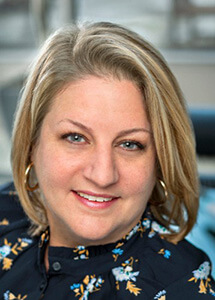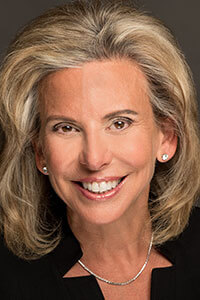Convene spoke with the incoming and outgoing chairs of the PCMA as a tumultuous 2020 came to a close to learn how they navigated the year that was and what they think this new year will bring. Here is an excerpt of those conversations — specifically in answer to the question: What do you think we’re going to be talking about in our industry a year from now?
Stuart Ruff-Lyon
Vice president of events and education for RIMS (the risk management society), 2020 chairman of the PCMA Board of Directors

Stuart Ruff-Lyon
That’s a tough one, sitting here next year right now. I think in 2021, the events industry is going to be having a lot of conversations around contracts, risk transfer, cancellation clauses, force majeure. All that is going to be at the forefront as we look forward to future business, because doing citywide conventions obviously takes several years of planning, and we’re already starting to see some difficulty with some future years around what force majeure looks like, or what cancellation clauses looks like. I think that’s going to be a tough conversation for meeting professionals to have with their partners. Everyone wants to protect themselves and reduce their own risk. However, we’re going to have to find a way of meeting in the middle somewhere on these conversations.
I think the conversation about event cancellation insurance will continue as well — there’s a lot of movement around that. But I think the kind of the conversation we’ll be having too is realizing a new world of opportunity where the role of digital has been interwoven successfully at that point within the next year with face-to-face events and really taking that hybrid experience to the next level, engaging larger and more diverse audiences around the world to events. Hopefully, we’ll be having a discussion about how they’re stronger than ever at the end of 2021. They’re going to look different from the past, but they’re going to be strong and at the forefront of opportunities for innovation and creation and diversity, just as they always have been.
READ the full Stuart Ruff-Lyon interview here.
Valerie Sumner
Owner of full-service event management company VRS Meetings & Events Inc., 2020 chair of the PCMA Foundation Board of Trustees

Valerie Sumner
That’s a good question. I think we’ll be talking about the success of the vaccine, the impact of the vaccine — hopefully, we’ll be seeing an incremental increase in our numbers because of the vaccine. I am thinking positive about that. I think we’ll be assessing the impact or outcomes from all the hybrid and virtual events that took place and the ROI. Did those formats get us through the crisis or did that shift us forever to a different kind of model, which I think will be more the case. And I also think we’re going to be thinking a lot more about the question of why do we really need to meet and the best model and channels to effectively deliver the experience.
After a year of virtual and then hybrid, what is the purpose of every event we do? Why are we doing it? And do we need to meet face to face? Can this be done hybrid? We will be saying, “Do you remember when we used to do jump on a flight for a short meeting?” and we will also be saying “This is a really important event with a tremendously relevant program. I need to be there in person.”
We will continue to closely evaluate costs and budgets. Getting back to the question of shifting budgets to achieve financial objectives for every event produced.
As we look to 2021 and beyond, it’s important that we keep in mind the resilience and resolve of the business events community. We continue to learn from yesterday, live each day with the promise of change, and remain resolute in our progress forward.
READ the full Valerie Sumner interview here.
Kirsten Olean, CAE, IOM
Director of meetings, Cystic Fibrosis Foundation, 2021 chair of the PCMA Board of Directors

Kirsten Olean
That’s a really good question. I don’t know what we’re going to be talking about. I guess I’m thinking more of the emotional side of it, like how are we going to be feeling? I think we’re going to be tired, because it will be another challenging year, but I think we are going to be feeling more joyful. I think we’re going to be reconnected to that passion that we have. I think we’ll be talking about the successes that we’ve had and what these meetings look like. Right now, we’re talking about those who have done virtual well and what that has looked like and we’re really learning from each other.
I think that as we move through the omni-channel meetings of 2021, there’s going to be that same question of who’s finding good ways to do them successfully and so that they bring in revenue? I think we’ll be talking about the people who have approached it with a lot of innovation and creativity. I think we’ll still be figuring out who’s going to make it and who’s not both on the organization side and on the supplier side.
I think we’re going to see suppliers evolve more over this year, and maybe we’ll be talking about some innovative things that destinations or hotels or convention centers are doing that are really helping to lift up this new model of meetings. I know we’re not going to be fully recovered by the end of 2021. We’re just going to get to the start of recovery, but I’m hoping that we are going to feel reconnected, passionate, joyful, and excited about where we are, even though we know that we still have work ahead of us.
READ the full Kirsten Olean interview here.
Angie Ranalli
Vice president of sales, Midwest region, at San Diego Tourism Authority, 2021 chair of the PCMA Board of Trustees

Angie Ranalli
We’re in for more instability for a while longer. Therefore, we’ll need to continue to be agile, more prepared, and garner resources for unforeseen circumstances.
We’ll hopefully prioritize and utilize data more effectively in everyday business decisions. And this practice will help create a more accurate picture for our industry’s advocacy efforts. We’ll collaborate more effectively across all parts of the events industry as long as we’re all speaking the same language — and I think we can see this starting to happen.
If we’ve learned anything from last year, it is that we need to change by design, not by crisis.
READ the full Angie Ranalli interview here.
